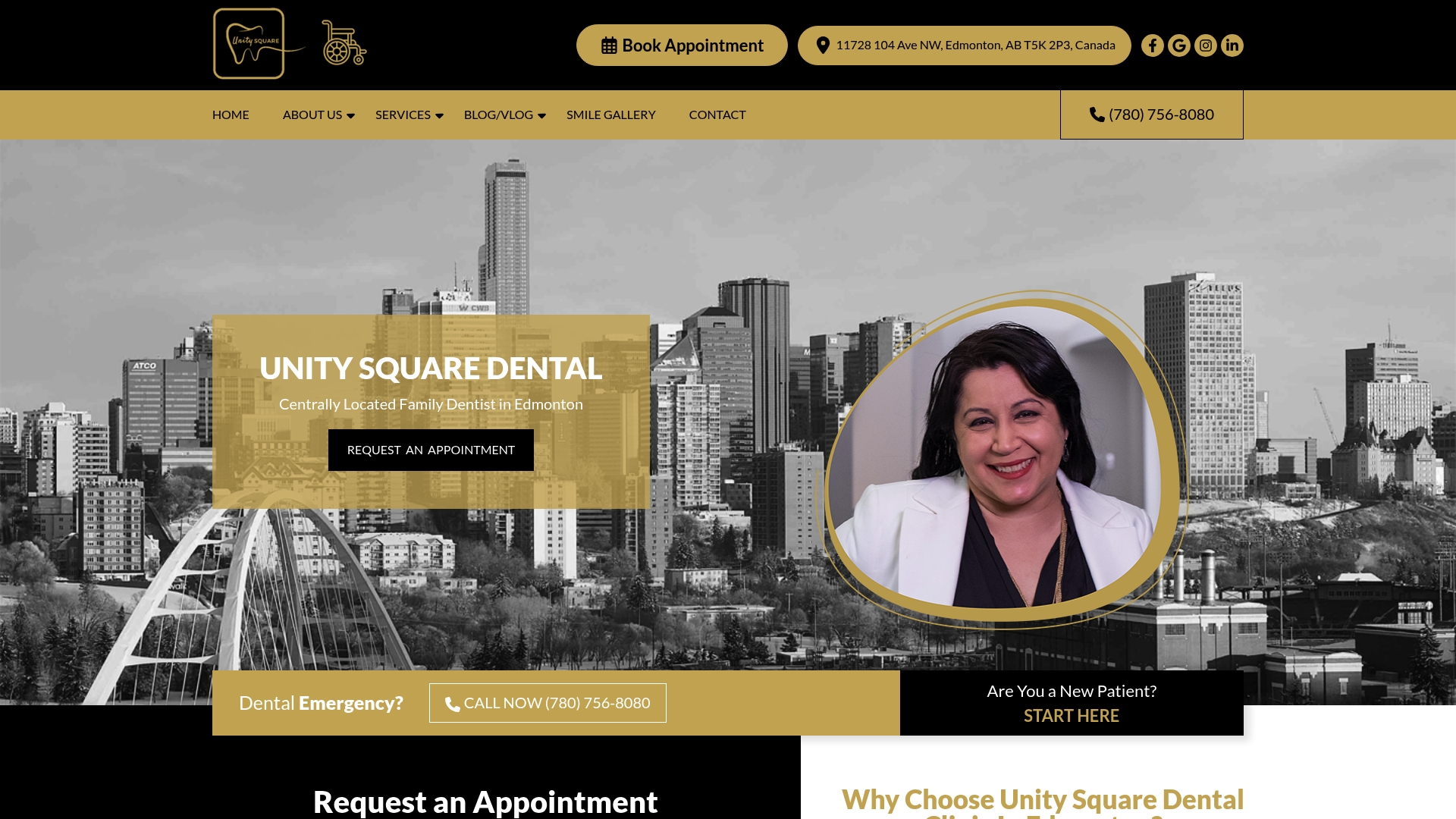
Everyone knows regular dental checkups are key for a healthy smile, but most people are surprised to learn that children should visit the dentist by age one and seniors may need up to four visits a year. Most folks aim for that twice-yearly routine, expecting it to cover their bases. The real shock is how much your age and specific health needs can change the rules, making the ‘one size fits all’ schedule more myth than fact.
Table of Contents
- Recommended Dental Visit Frequency for All Ages
- Special Situations: Emergency, Anxiety, and Accessibility
- Choosing the Right Edmonton Dentist for Your Family
Quick Summary
| Takeaway | Explanation |
|---|---|
| Children should see a dentist by age one. | Early dental visits help track development and prevent issues, establishing positive habits. |
| Adults typically need two dental visits per year. | Regular checkups are essential for preventive care, but some may need more frequent visits based on health conditions. |
| Seniors may require three to four visits annually. | Increased dental needs arise from age-related changes, necessitating more frequent assessments. |
| Recognize signs of dental emergencies. | Seek immediate care for severe pain, knocked-out teeth, or significant swelling to prevent complications. |
| Choose a dentist that accommodates all family members. | Look for providers with a comprehensive service range, flexible scheduling, and positive patient reviews to meet varying needs. |
Recommended Dental Visit Frequency for All Ages
Understanding the appropriate dental visit frequency is crucial for maintaining optimal oral health across different life stages. While individual needs vary, general guidelines provide a foundational framework for keeping your teeth and gums healthy.

Dental Visit Recommendations by Age Group
Children require a unique approach to dental care that evolves as they grow. Experts recommend that the first dental visit should occur by age one or within six months after the first tooth emerges. During early childhood, professional assessments help track development, prevent potential issues, and establish positive dental habits.
For school-aged children and teenagers, twice-yearly dental checkups become critical. These visits allow dentists to monitor tooth alignment, detect early signs of cavities, and provide preventive treatments like fluoride applications or dental sealants. According to the National Institute of Dental and Craniofacial Research, consistent dental visits can reduce the risk of extensive tooth decay by up to 80%.
Here is a summary table organizing recommended dental visit frequency by age group to help you quickly reference how often your family members should attend dental checkups:
| Age Group | Recommended First Visit | Regular Visit Frequency | Special Considerations |
|---|---|---|---|
| Infants/Toddlers (0-2 years) | By age 1 or first tooth | Dentist’s recommendation | Early habit formation, development checks |
| Children (3-12 years) | N/A | Every 6 months | Cavity monitoring, sealants, fluoride |
| Teenagers (13-18 years) | N/A | Every 6 months | Tooth alignment, preventive measures |
| Adults (19-64 years) | N/A | Every 6 months (typical) | Adjust for specific health conditions |
| Seniors (65+ years) | N/A | 3–4 times per year | Monitor for age-related dental issues |
Adult Dental Visit Frequency
Adults should maintain the standard recommendation of visiting a dentist twice a year for comprehensive examinations and professional cleanings. However, individuals with specific health conditions like diabetes, periodontal disease, or a history of rapid tartar buildup might require more frequent appointments. Our guide on preventive dental care provides deeper insights into personalized dental health strategies.
Some adults might need quarterly visits depending on their oral health status. Factors influencing visit frequency include:
- Genetic predisposition to dental problems
- Current oral health condition
- Smoking or tobacco use
- Systemic health conditions
- Pregnancy
- Weakened immune system
Special Considerations for Seniors
Older adults often require more specialized dental care due to age-related changes. Increased medication use, reduced saliva production, and potential mobility challenges can impact oral health. Seniors might benefit from three to four professional dental assessments annually to monitor and prevent age-related dental complications.
Regardless of age, consistent dental visits are an investment in overall health. They provide opportunities for early detection of potential issues, professional cleaning, and personalized guidance on maintaining optimal oral hygiene. Remember that these recommendations serve as general guidelines – your dentist can provide a tailored plan specific to your unique dental health needs.
Special Situations: Emergency, Anxiety, and Accessibility
Dental health encompasses more than routine checkups. Some individuals face unique challenges that require specialized approaches to dental care, including emergency needs, dental anxiety, and accessibility concerns.
Managing Dental Emergencies
Dental emergencies can strike unexpectedly, disrupting daily life and causing significant discomfort. Research from the National Hospital Ambulatory Medical Care Survey reveals that tooth disorders account for nearly 2 million emergency department visits annually. These emergencies can include severe tooth pain, knocked-out teeth, abscesses, or significant trauma that requires immediate professional intervention.
Recognizing the signs of a dental emergency is crucial. Patients should seek immediate care for:
- Severe tooth pain that does not respond to over-the-counter pain medication
- Knocked-out or partially dislodged teeth
- Significant facial swelling
- Uncontrolled bleeding from the mouth
- Dental infections with signs of spreading infection
Overcoming Dental Anxiety
Dental anxiety is a significant barrier to oral health for many individuals. A comprehensive study published in PubMed found that nearly 28% of patients report fear or anxiety about dental visits, with many experiencing intense terror that prevents them from seeking necessary care. This anxiety can lead to prolonged oral health issues and more complex treatments in the future.
Effective strategies for managing dental anxiety include:
- Communicate openly with your dental provider about your fears
- Request sedation options for complex procedures
- Bring a support person to appointments
- Practice relaxation techniques like deep breathing
- Consider professional counseling for severe anxiety
Accessibility and Inclusive Dental Care
Accessibility remains a critical consideration for many patients seeking dental care. Learn more about our commitment to accessible dental services for patients with mobility challenges, sensory needs, or other special requirements.
Key accessibility considerations include:
- Wheelchair-friendly facilities
- Flexible appointment scheduling
- Communication accommodations
- Specialized equipment for patients with physical limitations
- Gentle approaches for patients with sensory sensitivities
Each patient’s dental journey is unique. Understanding and addressing special situations ensures that everyone can receive the dental care they need, regardless of their challenges. Professional dental providers are equipped to offer personalized solutions that make dental care comfortable, accessible, and effective for all patients.
Choosing the Right Edmonton Dentist for Your Family
Selecting the ideal dental provider for your family involves careful consideration of multiple factors that extend beyond basic clinical skills. The right dentist becomes a long-term healthcare partner who understands your family’s unique oral health needs and provides comprehensive, compassionate care.
Essential Criteria for Family Dental Selection
Research from multiple dental practices highlights several critical factors families should evaluate when choosing a dental provider. Financial considerations, logistical convenience, professional expertise, and comprehensive service offerings form the foundation of an excellent dental selection process.
Key evaluation points include:
- Comprehensive service range covering pediatric to geriatric dental needs
- Flexible scheduling and convenient appointment times
- Advanced technological capabilities
- Transparent pricing and insurance compatibility
- Positive patient testimonials and professional credentials
To help you compare key considerations, here’s a summary table of essential criteria for choosing a family dental provider in Edmonton:
| Criteria | Why It Matters | Examples/Notes |
|---|---|---|
| Comprehensive Service Range | Supports all ages and needs in one place | Pediatric, adult, senior care |
| Flexible Scheduling | Makes dental visits easy to fit into your routine | Evening or weekend appointments |
| Technological Capabilities | Improves diagnosis, comfort, and efficiency | Digital X-rays, sedation options |
| Transparent Pricing/Insurance | Avoids billing surprises and ensures coverage | Works with major insurers |
| Patient Testimonials/Credentials | Indicates provider’s track record and reliability | Online reviews, degrees, memberships |
Understanding Family Dental Practice Dynamics
Experts recommend examining a dental practice’s ability to accommodate multiple family members across different age groups. A true family dental practice should offer specialized care that adapts to each individual’s unique requirements, from toddlers experiencing first dental visits to seniors managing complex oral health challenges.
Specific considerations for Edmonton families include evaluating a practice’s wheelchair accessibility, sedation options, weekend availability, and multilingual support. Learn more about our comprehensive family dental approach.
Practical Steps in Dental Provider Selection
Navigating the dental selection process requires a systematic approach. Begin by collecting recommendations from local healthcare providers, friends, and online review platforms. Schedule initial consultations to assess the practice’s environment, meet the dental team, and discuss your family’s specific oral health requirements.
Important questions to ask potential dental providers include:
- What preventive care strategies do you recommend?
- How do you manage dental anxiety in children and adults?
- What emergency dental services are available?
- Can you accommodate specific health conditions or mobility challenges?
- What technologies and treatment approaches do you utilize?
Ultimately, choosing a dental provider is a personal decision that balances professional expertise, technological capabilities, and interpersonal comfort. Prioritize a practice that demonstrates commitment to patient education, preventive care, and individualized treatment plans. A great family dentist becomes more than a healthcare provider – they become a trusted partner in your family’s overall wellness journey.

Frequently Asked Questions
How often should children visit the dentist in Edmonton?
Children should visit the dentist by age one and continue with regular checkups every six months thereafter to monitor their dental development and prevent issues.
How frequently do adults need dental checkups?
Adults typically need to visit the dentist twice a year for routine checkups and cleanings; however, some may require more frequent visits based on specific health conditions.
Why do seniors require more dental visits?
Seniors may need three to four dental visits per year due to age-related changes and increased dental health concerns, requiring more frequent assessments and preventative care.
What should I do in case of a dental emergency?
If you experience severe tooth pain, a knocked-out tooth, or significant swelling, seek immediate dental care. It’s important to act quickly to prevent further complications.
Give Your Family the Advantage of Personalized Dental Care in Edmonton
Is uncertainty about how often your family needs dental checkups leaving you worried about missing problems or overbooking unnecessary visits? As highlighted in the article, every age and situation comes with its own dental care needs. From your child’s first tooth to your parent’s specialized care, inconsistent visits may lead to overlooked issues, anxiety, and costly emergencies. What you want is peace of mind and a comfortable experience for your entire family under one trusted roof—with the flexibility and support you read about.

Discover how Unity Square Dental brings guidance and confidence to your family’s dental routine. Our clinic offers advanced technology, direct billing, and personalized solutions that fit your lifestyle, including wheelchair access and weekend appointments. Book your visit today to secure expert care and enjoy a simpler, more reassuring dental journey for every member of your family. Take the first step at https://unitysquaredental.ca and see what modern family dentistry in Edmonton can do for your health and comfort.
Recommended
- Dental Cleaning Frequency: Best Advice for Edmonton Families 2025 – Unity Square Dental
- What Is a Family Dentist? Guide for Edmonton Families 2025 – Unity Square Dental
- How to Find a New Dentist in Edmonton: Tips for 2025 – Unity Square Dental
- Why Should You Choose Our Edmonton Dental Clinic? – Unity Square Dental

